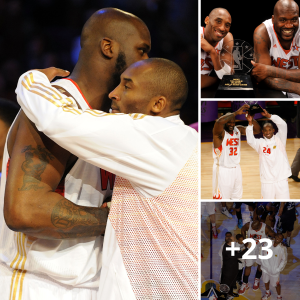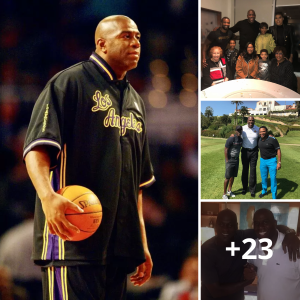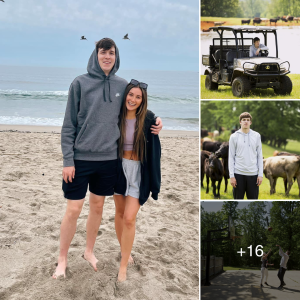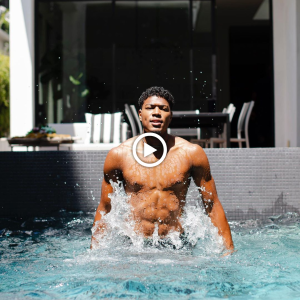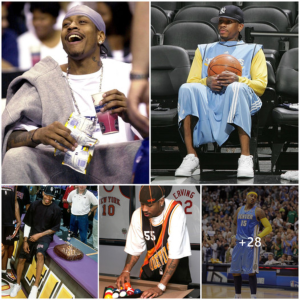Navigating NBA Christmas Day Games Conversation with Your Family: A Guide to Engaging Discussions

ROCKY WIDNER / GETTY IMAGES
If you plan to spend Christmas Day watching more NBA basketball than is really polite, odds are you’ll be watching with family or friends who aren’t as keen on basketball as you are. Here’s a rundown of every game on the marquee, and what the thinking fan is talking about.
Cleveland Cavaliers at Golden State Warriors
When to watch: 5 p.m. EST on ABC
CARM-Elo favorite: Warriors by 7 (76 percent)
This has been the most anticipated game of the new season since the moment last season ended. In last year’s epic final series, LeBron James pretty much single-handedly took two games from the Warriors — something the rest of the league has failed to do in 27 games this season. In the aftermath, we were left to wonder how that series might have gone if the Cavs had all-stars Kevin Love and Kyrie Irving in the lineup.
That was before the Warriors apparently took the offseason to solve basketball, and now seem to be competing with history as much as with their opponents. The FiveThirtyEight-approved strategy of letting Stephen Curry take more and more shots – no matter how ridiculous — seems to be paying off (though he should take even more).
But the Cavs haven’t been slouching, either. With Love playing every game this season, the Cavs are on a five-game win streak and lead the Eastern Conference by 2.5 games. The Cavs are allowing the fourth-fewest points per 100 possessions in the league this season, a big improvement from their 18th-place showing last season. And they finally just got Irving back in the lineup, which should goose their already-efficient offense.
So let’s talk defense.
For “Stephen Curry Is The Revolution” I used NBA shot-tracking data to create a model to estimate the expected value of each shot based on its location, the distance of the closest defender, and the time left on the shot clock, and then rated each shooter based on their results relative to expectation. We can use a similar technique to evaluate defenders. I’ve even expanded the model to include the number of dribbles that the shooter took and the amount of time that he held the ball.1
There’s one big complication: Part of defending is managing to defend shots of a certain quality better than others – but a big part of it is forcing your opponents into taking bad shots in the first place (though this is often more of a team effort). So let’s look at NBA defenders – and particularly the Warriors and Cavaliers — from both directions. Here’s the average expected value of shots, plotted against how well opponents did on those shots relative to expectation (lower-left is ideal here):

What can we learn from this chart? James seems to do well relative to his team – among players who have defended at least 100 shots his opponents’ average results relative to expectation are second only to Shawn Marion since the start of last season. On the other hand, Irving may liven up the offense, but by this measure he’s a significant defensive liability. It’s possible that the Cavs’ improved defense in 2015-16 may be, in part, due to his absence.
If you look at just the golden blobs versus the reddish blobs, it’s easy to see that the Warriors’ opponents tend to take worse shots than the Cavaliers, which is unsurprising given the Warriors’ reputation for good team defense. They have several players in the lower-left quadrant – the rarest and most effective type of defender. Draymond Green not only allows below average shots and defends them even better than average, but also is tasked with defending more shots (note bubble size) than almost anyone – his 1,528 shots as the closest defender is second in the NBA only to DeAndre Jordan.
So let’s see how that adds up. For this next chart I’ve estimated the total points above/below expectation that a defender contributed since the start of last season.2 Green is, well, you can see for yourself:

So your “smart” take-homes are that James is the Cavs’ best defender, Irving is their worst and Love hasn’t been too bad (or too good). Oh, and the Warriors have a second crazy freaking outlier holding down the other end of the court. Golden State rolls not by having one player who is dominant at everything and surrounded by lesser parts (James), but by having multiple guys who are OK at everything and are the absolute best at one thing each.
— Benjamin Morris
Chicago Bulls at Oklahoma City Thunder
When to watch: 2:30 p.m. EST on ABC
<CARM-Elo favorite: Thunder by 10 (84 percent)
The Bulls are a weird team now. Just when they seem to be figuring out their new up-tempo style of play under coach Fred Hoiberg, they’ll snap off a disappointing losing streak — like the three-game skid they carry into their Christmas Day game against the Thunder. Joakim Noah is injured again, Derrick Rose continues to be an uneven mess and Jimmy Butler has been heard openly questioning Hoiberg’s motivational style. Season’s greetings, Chicago!
Meanwhile, the Thunder have been on a tear, winning eight of their last nine games. They have the NBA’s second-best offense — best among teams not led by unstoppable shooters from another planet sent here to destroy Charles Barkley — and they’re playing better defense than they did a season ago. After injuries led to a hiatus from the playoffs last year, OKC is healthy and looking like a championship contender again, even in the crowded Western Conference.
So this should be a one-sided Christmas tilt, then, right? Well, maybe. The Bulls’ biggest offensive shortcoming this season has been in making shots from the floor — particularly two-pointers — and the Thunder are among the league’s best defenses at suppressing effective field goal percentage. But Chicago has also shown some signs of offensive life recently (albeit mostly against a lousy slate of opponents), and even in their current uncertain state, the Bulls have the defensive chops to at least aggravate OKC’s offensive stars.
But let’s not get too carried away here: CARM-Elo still favors the Thunder at home by a wide margin. Winning on the road in front of a big holiday audience would be sweet for the Bulls, but they may have to settle for simply having a few more signs that Hoiberg’s players are finally taking to his offense.
— Neil Paine
San Antonio Spurs at Houston Rockets
When to watch: 8 p.m. EST on ESPN
CARM-Elo favorite: Spurs by 4.5 (68 percent)
The offensive evolution of Kawhi Leonard is nothing short of remarkable. As of today, 67 NBA players have tried at least 100 3-pointers this season. Of that group, nobody has made a higher share than Leonard, who’s sunk a ridiculous 47 percent of his 3-point shots this season, outpacing J.J. Redick and Stephen Curry for the best mark in the league. But here’s the thing: Redick and Curry arrived in the NBA as incredible shooters; Leonard came in as a bad one. Check out this Draft Express blurb on Leonard from June 2011:
Leonard is not only an average ball-handler, but he also struggles to make shots consistently from beyond the arc. His 0.743 points per shots on jumpers ranks 16th of 17 in the class, where he shot an abysmal 31% from the field. His struggles extend both to his catch and shoot jumpers (32%) and pull-ups (28%).
It’s hard to overstate how far Leonard has come since then, and it’s hard to believe that the following shot chart belongs to a guy who was known for his “abysmal” jumper just a few years back.

On top of his dominance beyond the arc, Leonard has also developed a top-tier interior game. He’s become the Spurs’ top scorer, in part because he provides reliable catch-and-shoot punctuation marks at the end of those gorgeous Spurs playmaking sentences, but also because he can now generate good shots off his own dribble. Out of 102 players that have tried 60 pull-up jumpers this season, Leonard ranks fourth in field goal percentage (45.8), ahead of guys like Steph Curry and Kevin Durant.
Speaking of pull-up jumpers, Leonard’s likely Christmas matchup, James Harden, takes a whole lot of them. Entering today, only Russell Westbrook has tried more. Unlike Leonard, however, all that volume isn’t matched by efficiency. This season, Harden is putting up the lowest effective field goal percentage of his career. He’s still getting to the line a lot (11.1 free throws per game), which is great, but at a stage in his career when his shooting efficiency should still be ascendant – as Leonard’s is – Harden is exhibiting downticks.

Harden’s offensive woes are a perfect microcosm of the Rockets at-large; coming off of a great 2014-15 season, it looked as if Harden and the Rockets were destined for greatness. But it hasn’t happened, and thanks to questionable defensive effort and some troubling trends on offense, the Rockets are suddenly on the naughty list.
Still, the Christmas game provides Harden and Houston with a chance to score a big win on a big stage against a big rival. Can they do it? Of course they can. Will they do it? That depends a lot on who gets the best of the Leonard-Harden matchup.
— Kirk Goldsberry
Los Angeles Clippers at Los Angeles Lakers
When to watch: 10:30 p.m. EST on ESPN
CARM-Elo favorite: Clippers by 7.5 (78 percent)
This Christmas Day will be the biggest stage the NBA’s battle of Los Angeles has seen — somehow, the Lakers and Clippers never have faced each other in the playoffs or on a major holiday before — so it’s a shame that neither team is in peak form for the showcase.
The Lakers, of course, have been an utter and complete debacle in Kobe Bryant’s final NBA season. Thanks to the league’s third-worst offense and its second-worst defense, the Lakers are the only team remotely capable of challenging the abhorrent 76ers as the NBA’s worst club. Bryant’s creaky old-man woes have been well-documented: Astonishingly, he ranks among the league’s top 5 percent of shot-takersour good friend usage rate (the Basketball-Reference.com version).
“>3 and its bottom 5 percent of shot-makers,true shooting percentage. “>4 with a place among the bottom 6 percent of defendersdefensive plus-minus — our 50-50 combination of defensive Box Plus/Minus (BPM) and Real Plus-Minus (RPM). “>5 thrown in for good measure. Although Bryant’s been bad, he’s had a lot of help in making the Lakers this terrible. Including Bryant, six Laker regulars6 rank among the league’s bottom quartile of players this year, according to the aggregated plus/minus metric7 we used to rate players for our CARMELO player projection system. On Christmas night, you will be treated to a very bad Lakers team populated with numerous very bad players.Mercifully, the Clippers are nowhere near as awful as the Lakers, but they’ve also seen better days. They came into the season as a solid contender (albeit one running behind the Warriors, Spurs and Thunder out West), but the Clips haven’t really found much of a rhythm this year. They sported a .500 record less than a month ago, and Chris Paul’s offensive machine hasn’t run anywhere near as smoothly as in years past. Although the Clippers still boast three legitimate superstars in Paul, Blake Griffin and DeAndre Jordan, plus sweet-shooting J.J. Redick and useful 3-and-D wing (and erstwhile Laker) Wesley Johnson, this roster also has major holes. Guard play off the bench, in the form of Jamal Crawford and Austin Rivers, has been particularly horrid; newcomers Lance Stephenson and Paul Pierce haven’t made many positive contributions, either.
In other words, the Clippers you watch on Christmas will be a squad still very much trying to regain its footing after a less-than-impressive start to the season. But there’s still time for a resurgence — especially the more they get to play the ghastly Lakers.
— Neil Paine
New Orleans Pelicans at Miami Heat
When to watch: 12 p.m. EST on ESPN
CARM-Elo favorite: Heat by 3.5 (65 percent)
This is one of the lesser games on the slate, but don’t write it all the way off. Anthony Davis on a nationally televised game is always worthwhile, and the Heat just might be the team best constituted to give the Cavs a real scare in the East.
The Anthony Davis takeover never got off the ground. As of this writing Davis is 33rd in Real Plus-Minus (3.10), just edging out Clint Capela (3.09). His 0.547 point per possession, per Synergy Sports, on isolation plays barely edges out Zach Randolph (0.538), whose first step belongs in the fossil record. Davis still is one of the best players in the NBA, he just isn’t an All-Father deity who can counterbalance a misshapen offense and a rash of injuries that resulted in Toney Douglas, the worst point guard in the history of all things, playing significant minutes early in the season.
As for the Heat, they look as legitimate as any non-Cavs Eastern team can look. Chris Bosh is back after sitting out with blood clots in his lungs, and is having his best rebounding season since his Toronto years. Meanwhile, Hassan Whiteside is a legitimate all-star NBA center, and is on pace to be the first player in 20 years to average four blocks per game. Goran Dragic has some shockingly bad shooting percentages, but they’re so far off of his recent season averages that it would be strange for them not to rebound by the end of the year. Justise Winslow has been sublime.
And then there’s Dwyane Wade. As things stand, Dwyane is fine. His shooting percentages and free throw rate are below where you’d like them to be, but he’s contributing enough to give Miami what it needs out of him. Looking toward the playoffs and beyond, however, that may not be enough. For the post-Jordan rim-running shooting guard, the post has been the go-to old-man-game reprieve. Jordan, Kobe, Magic, Oscar — everyone on down to Deron Williams and old-ass Andre Miller — big guards have always turned to the post late in their careers, and Wade’s post game has gone missing.
These days there are two kinds of Dwyane Wade post-ups. On the more common variety, Wade treats the post-up as a sort of stop-motion isolation drive, making his initial move to get near the block, then rushing through a post-up sequence and firing up a quick shot. It isn’t so much the ungracefulness of this that makes it startling as the way he seems anxious to just get the whole thing over with. Usually, this doesn’t end well. Other times, Wade works down into the post naturally, takes his time, and gets himself a short little turnaround. It isn’t very smooth, and if you tilt your head you can almost hear him counting off the steps in his head, but it’s a far cry better than watching him careen into the lane, pivot into a half-hearted post-like-motion, and side-arm a heater at the rim like a miniature Dwight Howard. And unlike the Howard impersonation, this shot also has the advantage of occasionally going into the basket.
He didn’t always look like this. His post-up possessions have dipped to 0.82 point per possession, per Synergy Sports, putting him in the 49th percentile. But just two seasons ago, he was in the 92nd percentile on post-up possessions (1.06 PPP) and his post plays most often began with him sealing a smaller defender on the block, receiving an entry pass, then going to work. What’s changed since then? For one, he’s on the ball a hell of a lot more since LeBron James took his talents back north — he went from running pick-and-rolls on 24.5 percent of his plays in 2013-14 to 39 percent this season. That’s a huge uptick in workload, and affects how free Wade is to roam around off the ball, looking for a mismatch he can seal and post. A return to form from Dragic might alleviate this wrinkle, but it could just as likely be that Wade’s athleticism is shot. His isolation points per possession have fallen to the 21st percentile this season, after spending most of his career up around the 80th, even though his trademark shot-fake remains world-class. All those semi-iso post-ups that look awkward on Wade now were downright terrifying just a few years ago, when Wade was liable to drive down the left wing, stop on a nickel, show you the ball over his right shoulder, then make a move like Russ Westbrook back toward the cup. You don’t see too much of that anymore.
Will Wade’s withered-up post game be a deciding factor in the playoffs? It sounds absurd, but when the margins shrink and Wade’s hand-cranked first step isn’t cutting it, getting some kind of production out of him will be more important than ever. So as you’re watching at home, if you want one thing to zero in on and nerd out over, it may as well be Wade down low.
